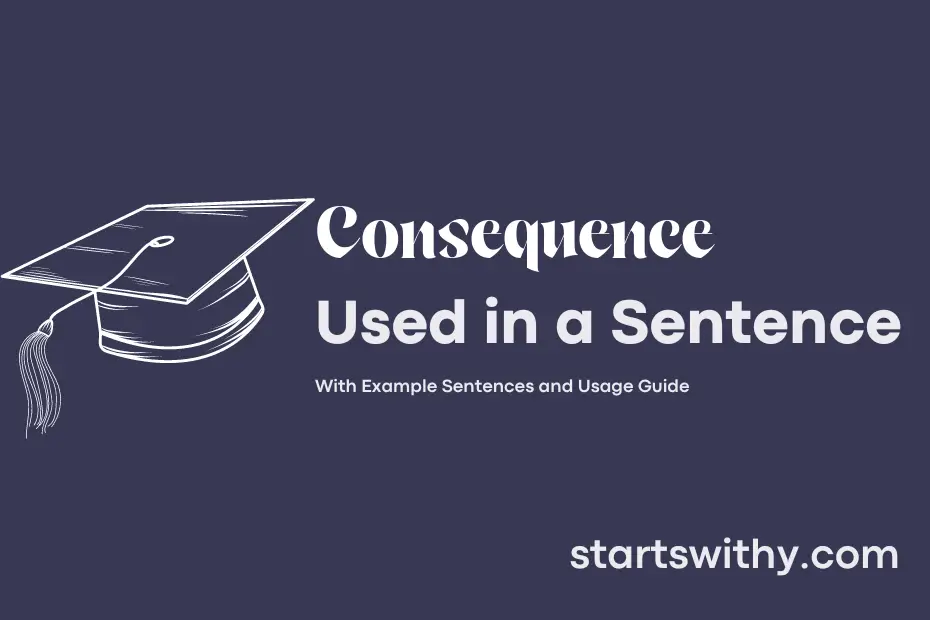Have you ever wondered about the impact of our actions and decisions? The concept of consequence is the result or outcome that stems from a particular action or event.
Whether positive or negative, consequences play a crucial role in shaping our lives and the world around us. Understanding the consequences of our choices can guide us towards making more informed decisions and taking responsibility for the impact we have on others.
7 Examples Of Consequence Used In a Sentence For Kids
- Consequence: If you don’t brush your teeth, the consequence is that they may not be clean.
- Eating too much candy can have a consequence on your teeth.
- If you don’t wear sunscreen, the consequence could be a bad sunburn.
- Not finishing your homework may have a consequence of getting a low grade.
- Consequence: If you don’t share your toys, your friends may not want to play with you.
- Making loud noises in the library can have a consequence of getting a warning.
- Consequence: If you don’t clean up your room, you may not be able to find your favorite toy.
14 Sentences with Consequence Examples
- Consequence: Not attending lectures regularly in college can have a negative consequence on your grades.
- Consequence: Submitting assignments after the deadline may result in a penalty as a consequence.
- Consequence: Spending all night partying can lead to the consequence of feeling exhausted during important exams the next day.
- Consequence: Plagiarism in academic work can have severe consequences, including suspension or expulsion.
- Consequence: Procrastinating on studying can result in the consequence of not being well-prepared for exams.
- Consequence: Engaging in unethical behavior during group projects can lead to damaging consequences for your reputation among peers and faculty.
- Consequence: Not participating in extracurricular activities may have the consequence of missing out on valuable networking opportunities.
- Consequence: Mismanaging finances can lead to the consequence of struggling to pay for essential college expenses.
- Consequence: Constantly skipping classes can result in the consequence of missing important announcements and information.
- Consequence: Partaking in risky behavior at college parties may have serious consequences for your personal safety and well-being.
- Consequence: Ignoring mental health issues can lead to the consequence of negatively impacting your academic performance.
- Consequence: Failing to meet the minimum attendance requirements can result in the consequence of being barred from appearing in exams.
- Consequence: Engaging in cheating during exams can have severe consequences, such as being disciplined by the college administration.
- Consequence: Not preparing for campus interviews can lead to the consequence of missing out on job opportunities after graduation.
How To Use Consequence in Sentences?
Consequence is an important word that signifies the result or effect of an action. When using Consequence in a sentence, follow these tips for beginners:
-
Identify the main action or event that leads to a particular Consequence. For example, “Eating unhealthy food can have serious health consequences.”
-
Place the word Consequence in the appropriate part of the sentence. It is often used towards the end of the sentence to show the cause and effect relationship. For example, “She forgot to set her alarm, and as a consequence, she missed her morning meeting.”
-
Make sure the sentence structure is clear and easy to understand. Use simple language and avoid complex sentences that may confuse the reader.
-
Pay attention to the context in which you are using Consequence. It can refer to both positive and negative outcomes, so ensure that the sentence reflects the intended meaning.
-
Practice using Consequence in various sentences to become more comfortable with the word and its usage. This will help you to incorporate it naturally into your writing and conversations.
By following these tips, beginners can effectively use Consequence in a sentence to convey the outcome or result of a specific action or event.
Conclusion
In conclusion, sentences that involve consequences are important tools in communication, as they help convey the results or outcomes of actions taken. These sentences usually highlight the cause-and-effect relationship, explaining what will happen as a result of a certain action. By clearly stating the consequences, individuals can better understand the potential outcomes of their choices and make informed decisions.
Whether used in everyday conversations or in more formal writing, sentences with consequences serve to provide clarity and drive home the significance of decisions made. Being aware of the possible outcomes can help people weigh their options, anticipate the results of their actions, and ultimately navigate situations more effectively, leading to more informed and thoughtful approaches in various aspects of life.




